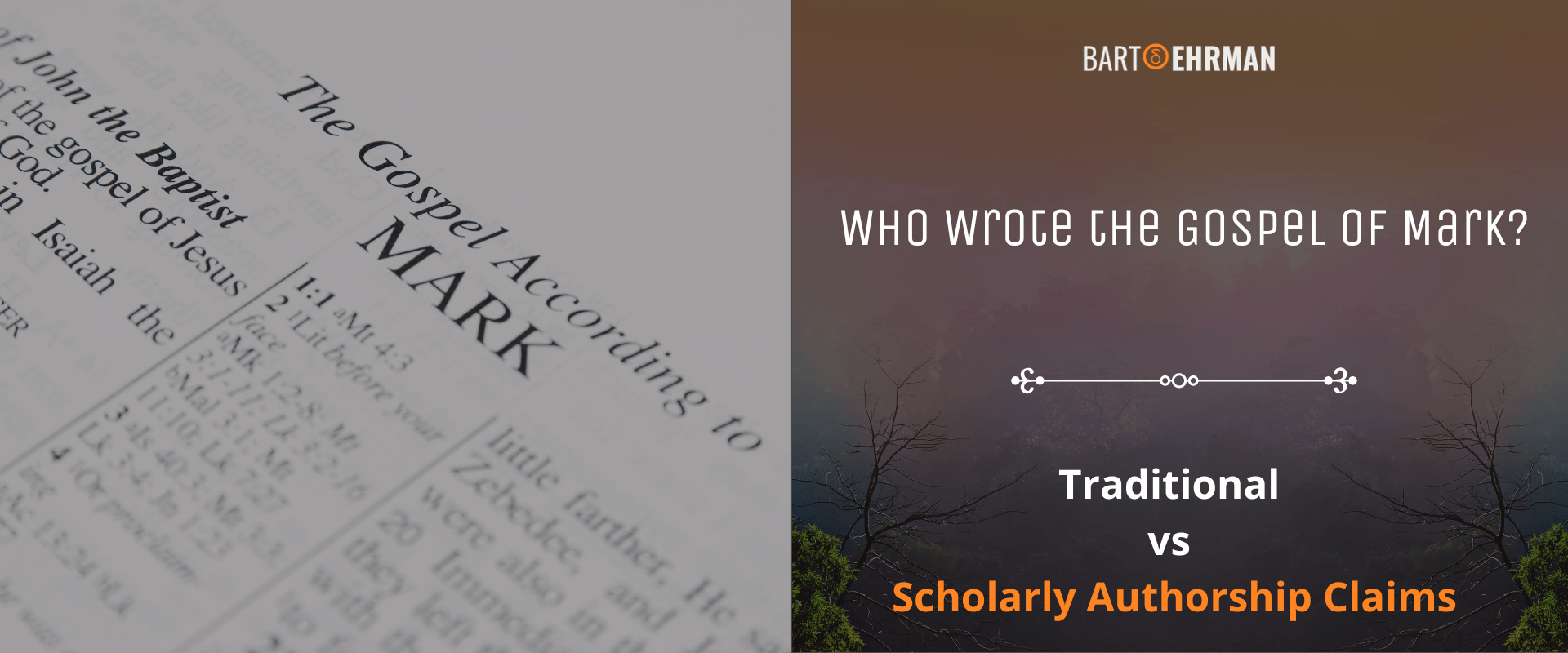Who Wrote the Gospel of Mark? Traditional VS. Scholarly Claims

Written by Marko Marina, Ph.D.
Author | Historian
Author | Historian | BE Contributor
Verified! See our guidelines
Verified! See our editorial guidelines
Date written: July 14th, 2023
Edited by Laura Robinson, Ph.D.
Disclaimer: The views and opinions expressed in this article belong to the author and do not necessarily match my own. - Dr. Bart D. Ehrman
When I ask my undergraduate students who wrote the Gospel of Mark, they usually say Mark! However, they quickly realize that the answer is not that simple.
In the following discussion, I explore the authorship of Mark’s Gospel, examining both traditional claims and those of biblical scholars.
If you find the topic of the authorship of the Gospels intriguing and want to gain a better understanding of its nuances, I would like to invite you to attend a free 50-minute webinar with Bart Ehrman. As a distinguished scholar of early Christianity, he will provide an engaging and informative explanation of the Gospels’ authors.

Mark’s Gospel as Peter’s Testimony? Traditional Theory
According to Church tradition, the author of the earliest Gospel was Mark. This Mark is commonly believed to be the same John Mark mentioned multiple times in the Acts of the Apostles as an associate of Paul and Barnabas.
In Acts 12:12, it’s mentioned that John Mark’s home served as a gathering place for Peter and other Christians. He is also identified as a coworker of Paul in Colossians 4:10, Philemon 24, and 2 Timothy 4:11.
Furthermore, John Mark is mentioned as a very close companion of Peter in 1 Peter 5:13. Interestingly, during the 2nd century, it was widely believed that the author of the Gospel of Mark was also an interpreter for the apostle Peter.
The concept that the author of Mark’s Gospel was a close associate of Peter played an essential role in developing the New Testament Canon. The Church maintained that the earliest Gospel was based on the testimony of Jesus’s closest disciple. However, most critical scholars are skeptical regarding the traditionally ascribed authorship of the Gospel of Mark.
What do Scholars Think about the Authorship of Mark’s Gospel?
Modern scholars establish the authorship of a particular document by examining two key factors: external attestations and internal evidence.
The notion that an associate of Peter named Mark wrote the earliest Gospel emerged decades after the text was written.
As Bart observes in The New Testament: A Historical Introduction to the Early Christian Writings, the earliest author to associate John Mark with the Gospel of Mark was the Church bishop Irenaeus. Irenaeus quoted all four gospels in his book Against the Heresies, written approximately 185 C.E.
Irenaeus (3.1.1.) claims that John Mark wrote the Gospel of Mark based on Peter’s preaching. However, some scholars, like Richard Bauckham, believe that an earlier external source suggests that John Mark could have been the author of the Gospel of Mark.
Papias’s Testimony?
The attestation in question is attributed to Papias, who was a bishop in Hierapolis, which is now located in modern-day Turkey. Papias authored a work called Exposition of Dominical Oracles (c. 120 C.E.), but unfortunately, only 16 fragments of his work survived as quotations by later writers.
The most important in terms of the author of Mark’s Gospel are those preserved by Eusebius (c. 325. C.E.). In his Ecclesiastical History, Eusebius quotes (3.39.15.) Papias as saying that Mark, Peter’s interpreter, “wrote down accurately as many things as he recalled from memory, though not in an ordered form, about the things said or done by the Lord.”
However, his testimony presents several problems. Firstly, Papias claims (Ecclesiastical History, 3.39.2-4.) he received his information from the “companions” of the “elders” who were followers of the “apostles.” This implies that he, at best, relied on fourth-hand oral traditions passed down for years.
The historical reliability of these stories is doubtful. Moreover, Papias claims in the same excerpt that Mark did not omit any information he heard from Peter. However, it seems unlikely that our current Gospel of Mark includes every detail Peter remembered about Jesus’s life, as the narrative is brief.
Scholars Doubt Papias Was Linked to Jesus's Apostles
Additionally, Papias has a track record of reporting inaccurate information about Jesus and his disciples. A case in point would be his description of Judas’ death which is widely regarded as unreliable.
Stephen C. Carlson wrote an excellent guest post on Bart’s blog, suggesting Papias did not have a personal link to Jesus’s apostles. The renowned New Testament expert, Delbert Burkett, concluded that most critical scholars disagree with Papias’s assertion that Mark’s Gospel was founded on Peter’s preaching.
Such a claim probably arose from the Church’s desire to link their writings to some authoritative figure close to Jesus, such as Peter.” Consequently, the first external attestation for the authorship of Mark’s Gospel came more than a century after it was originally written. That significantly reduces the likelihood that John Mark, an associate of Peter, wrote the Gospel of Mark.

What Does the Text Itself Say? The Internal Evidence
The Gospel of Mark does not provide evidence that explicitly identifies John Mark as the author. Unlike other works in the Greco-Roman literary tradition, Mark’s Gospel does not clearly state who the author is.
However, hints in the narrative give us insight into the author’s background. Interestingly these clues go against the traditional theory of authorship.
Firstly, the author of the Gospel of Mark demonstrates a lack of familiarity with Judean geography. When describing Jesus’s travel patterns (7:31), the author states that Jesus “left the vicinity of Tyre and went through Sidon, down to the Sea of Galilee and into the region of Decapolis.” However, this route would lead Jesus to Antioch rather than the Sea of Galilee.
Additionally, the author makes mistakes when quoting from the Hebrew Bible. At the beginning (1:3), he attributes a passage to Isaiah when it comes from Malachi (3:1). It is unlikely that an educated Palestinian Jew would make such a blunt mistake.
The author also shows a misunderstanding of Jewish customs. For instance, he erroneously claims (7:3-4) that the “Pharisees, and all the Jews,” practiced handwashing before eating. But that was not a universal custom among Jews!
Verdict: Not Proven
Due to these (and other) factors, most scholars believe that the author of Mark’s Gospel was a Gentile Christian who lived outside of Palestine – possibly in Rome. Joel Marcus concludes that “the fairest assessment of John Markan authorship is akin to the nonprejudicial Scottish legal verdict of not proven.”
In their notable study, Mark as Story: An Introduction to the Narrative of a Gospel, David Rhoads and Donald Michie assert that while the author of the Gospel of Mark drew upon earlier sources, “the final text is a literary creation with autonomous integrity.”
This leads us to the final point: each Gospel writer had their own unique way of presenting Jesus. So, what is the main message of the Gospel of Mark?
Essentially, Mark emphasizes that Jesus is both the Son of God and the Jewish Messiah who had to endure suffering and death for the benefit of others.
But Professor, What about the Titles?
Sooner or later, someone in the classroom mentions the titles of the Gospels, presupposing they were always there. However, most scholars think they were added later and were not part of the original documents.
As noted by Ed Sanders and Margaret Davies: “The Gospel writers did not follow the usual Greek (and Roman) practice of naming themselves but rather the tradition of anonymous publication, a practice frequently followed in Jewish literature.”
Even the structure of titles points to the same conclusion: The Gospel According to Mark (Κατά Μάρκον). The proposition “according to” (κατα) strongly suggests that the title was attached later by someone else. Bart theorizes that a scribe in Rome while copying the collection of four Gospels in the later part of the 2nd century C.E., may have been responsible for that.
Conclusion
Who then wrote the Gospel of Mark? Many lay readers assume it was John Mark – a close associate of Peter.
Historians take a different perspective when considering this question. They examine the Gospel as a historical source and analyze both internal and external evidence. The earliest Gospel was probably written anonymously by a Gentile Christian for a community outside of Palestine.
From an academic standpoint, the Gospels offer many remarkable insights into the origins of Christianity, as expertly shown in Bart’s course “The Unknown Gospels.”
You can find out more about his course by clicking the link below.
FREE COURSE!
WHY I AM NOT A CHRISTIAN
Raw, honest, and enlightening. Bart's story of why he deconverted from the Christian faith.
Over 6,000 enrolled!

